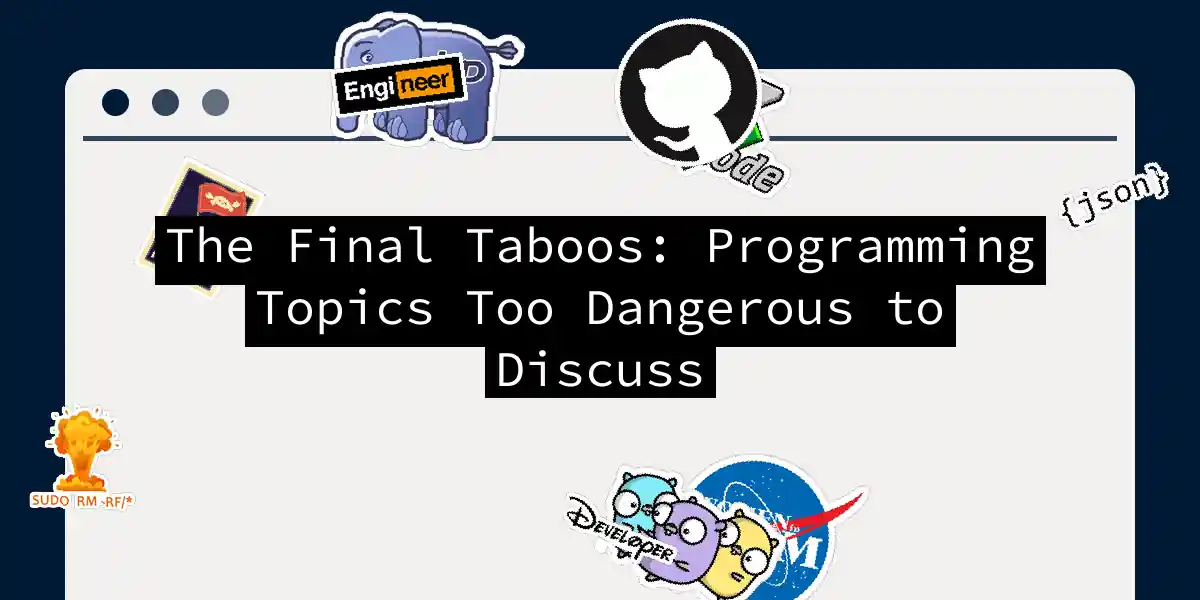Introduction to the Taboos
In the world of software development, there are certain topics that are considered too sensitive or controversial to discuss openly. These “taboos” often revolve around programming practices, languages, and philosophies that can spark heated debates among developers. Let’s dive into some of these forbidden subjects and explore why they’re so contentious.
1. Object-Oriented vs. Functional Programming
One of the most enduring debates in programming is between object-oriented programming (OOP) and functional programming (FP). OOP advocates argue that it provides a structured approach to organizing code, while FP proponents claim it offers greater flexibility and composability. This debate often becomes heated, with each side accusing the other of being outdated or inefficient.
Example: A Simple Calculator in OOP vs. FP
Let’s consider a simple calculator implemented in both styles:
OOP (Java)
public class Calculator {
private int result;
public void add(int num) {
result += num;
}
public int getResult() {
return result;
}
}
FP (JavaScript)
function add(num1, num2) {
return num1 + num2;
}
const result = add(5, 10);
console.log(result); // Outputs: 15
2. The Role of Comments in Code
Comments are another contentious issue. Some developers believe that comments are essential for explaining complex code, while others see them as redundant or even harmful if they become outdated. This debate highlights the tension between code readability and the potential for comments to become a form of code duplication.
Example: Commenting Code
Consider the following code snippet with and without comments:
Without Comments
def calculate_area(length, width):
return length * width
With Comments
# Function to calculate the area of a rectangle
def calculate_area(length, width):
# Multiply length by width to get the area
return length * width
3. The Value of Unit Testing
Unit testing is a widely accepted practice, but some developers argue that it can be overemphasized or even counterproductive. They claim that writing tests before code can lead to inflexible designs and that good developers should focus on writing robust code from the start.
Example: Unit Testing with JUnit
Here’s an example of a simple unit test using JUnit:
import org.junit.Test;
import static org.junit.Assert.assertEquals;
public class CalculatorTest {
@Test
public void testAdd() {
Calculator calculator = new Calculator();
calculator.add(5);
assertEquals(5, calculator.getResult());
}
}
4. The Importance of Coding in Spare Time
Some programmers believe that coding in spare time is essential for becoming truly proficient. Others argue that this is not necessary and that dedication during work hours is enough. This debate touches on the broader question of what it means to be a “good” programmer.
5. The Best First Programming Language
There’s ongoing debate about which language should be taught first to beginners. Some argue for languages like Java or Python, while others suggest starting with C or C++ to understand fundamental concepts like memory management.
Sequence Diagram: Learning Path
6. Debugging Techniques
The use of print statements for debugging is another contentious topic. Some developers see it as a quick and effective method, while others prefer more structured approaches like using a debugger.
Example: Debugging with Print Statements
def calculate_area(length, width):
print(f"Length: {length}, Width: {width}")
area = length * width
print(f"Area: {area}")
return area
Conclusion
These programming taboos highlight the diverse perspectives within the software development community. By discussing these topics openly, we can foster a more inclusive and innovative environment where different approaches are valued and learned from. Whether you’re a seasoned developer or just starting out, engaging with these debates can enrich your understanding of programming and its many philosophies. So, let’s embrace the controversy and keep the conversation going
